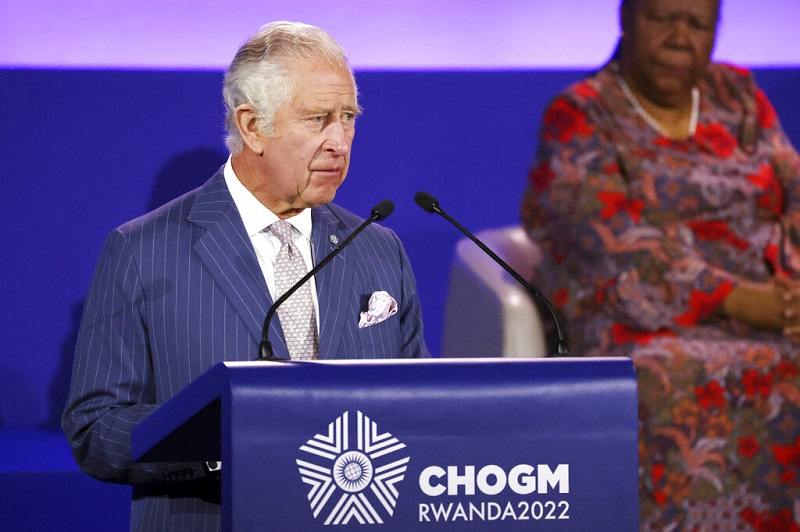
Britain’s Prince Charles delivers his message during the opening ceremony of the Commonwealth Heads of Government Meeting on Friday.
13:04 JST, June 25, 2022
KIGALI (AP) — Leaders of Commonwealth nations met in Rwanda’s capital Friday to tackle climate change, tropical diseases and other challenges deepened by the COVID-19 pandemic.
The summit for Commonwealth heads of state in Kigali is the culmination of a series of meetings this week that officials said yielded some success in efforts to improve the lives of people in the 54-nation association that is home to 2.5 billion people.
The Commonwealth’s member states range from vast India to tiny Tuvalu. The African nations of Togo and Gabon have asked to join the Commonwealth despite having no colonial history with Britain.
The group of nations comprises mostly former British colonies, and its titular head is Queen Elizabeth II. But countries such as Mozambique and Rwanda — a former Belgian colony with an Anglophile leader — previously launched successful bids to join.
Prince Charles is representing his mother, who at 96 is restricting her official duties. The summit is taking place at an uncertain time for the British monarchy as well as the Commonwealth, whose relevance is sometimes questioned.
The bloc faces a new challenge as some member nations discuss removing the queen as their head of state. She is the head of state of 14 Commonwealth realms, but Barbados cut ties with the monarchy in November, and several other Caribbean countries, including Jamaica, say they plan to follow suit.
In his remarks Friday, Charles said “free” nations can make such decisions “calmly and without rancor.” The heir to the throne also spoke of his sorrow over slavery and its legacy for Indigenous communities and others, saying the Commonwealth “must find ways, new ways, to acknowledge our past.”
“Quite simply, this is a conversation whose time has come,” he said.
Commonwealth members reelected British diplomat Patricia Scotland as the group’s secretary-general on Friday. The summit is set to wrap up Saturday with the issuing of a final policy communique.
Rwanda’s hosting of the summit is contentious to some who cite the East African country’s poor human rights record under Paul Kagame, an authoritarian leader who has been de facto leader or president since a 1994 genocide.
Other critics are unhappy with what they see as an illegal and cruel deal with Britain to transfer migrants thousands of miles to Rwanda. That agreement faces legal hurdles, and the first group of migrants has yet to arrive in Africa.
World leaders attending the summit range from Canadian Prime Minister Justin Trudeau to Nigerian President Muhammadu Buhari. British Prime Minister Boris Johnson, whose leadership of the Conservative party suffered a heavy blow overnight as voters rejected the party’s candidates in two special parliamentary elections, is also in Rwanda.
Some meetings on the margins of the summit reported successes in efforts to address pressing issues such as managing climate change and deadly diseases.
More than $4 billion was pledged Thursday toward global efforts to accelerate the fight against malaria and other neglected tropical diseases. The money will come from governments, philanthropists and others in the private sector. In addition, pharmaceutical companies donated 18 billion tablets to prevent and treat those diseases.
Observers said the fundraising marks a significant breakthrough as malaria is a leading killer in Africa.
Dr. Francisca Olamiju, the head of a non-governmental organization in Nigeria that advocates for the poor, told The Associated Press of her high expectations for such a big gathering to bolster campaigns against tropical diseases.
World leaders must “walk the talk” and mobilize more resources for the cause, she said.
Summit participants also are urging increased action to curb global warming ahead of a United Nations climate change summit scheduled to take place in Egypt in November. Commonwealth governments have been asked to submit their targets for reducing greenhouse gas emissions by Sept. 23.
At the summit, Commonwealth leaders are expected to adopt a plan to address climate change, land degradation and biodiversity loss. The Living Lands Charter charter aims to achieve climate goals through a mixture of policy influence, financing, technical assistance, governance and sharing knowledge across nations.
Some 32 of the Commonwealth’s members are small states, with 25 of them small islands and developing states classified as vulnerable to climate change.
Top Articles in News Services
-

Survey Shows False Election Info Perceived as True
-

Hong Kong Ex-Publisher Jimmy Lai’s Sentence Raises International Outcry as China Defends It
-

Japan’s Nikkei Stock Average Touches 58,000 as Yen, Jgbs Rally on Election Fallout (UPDATE 1)
-

Japan’s Nikkei Stock Average Falls as US-Iran Tensions Unsettle Investors (UPDATE 1)
-

Trump Names Former Federal Reserve Governor Warsh as the Next Fed Chair, Replacing Powell
JN ACCESS RANKING
-

Producer Behind Pop Group XG Arrested for Cocaine Possession
-

Japan PM Takaichi’s Cabinet Resigns en Masse
-

Man Infected with Measles Reportedly Dined at Restaurant in Tokyo Station
-

Israeli Ambassador to Japan Speaks about Japan’s Role in the Reconstruction of Gaza
-

Videos Plagiarized, Reposted with False Subtitles Claiming ‘Ryukyu Belongs to China’; Anti-China False Information Also Posted in Japan






















